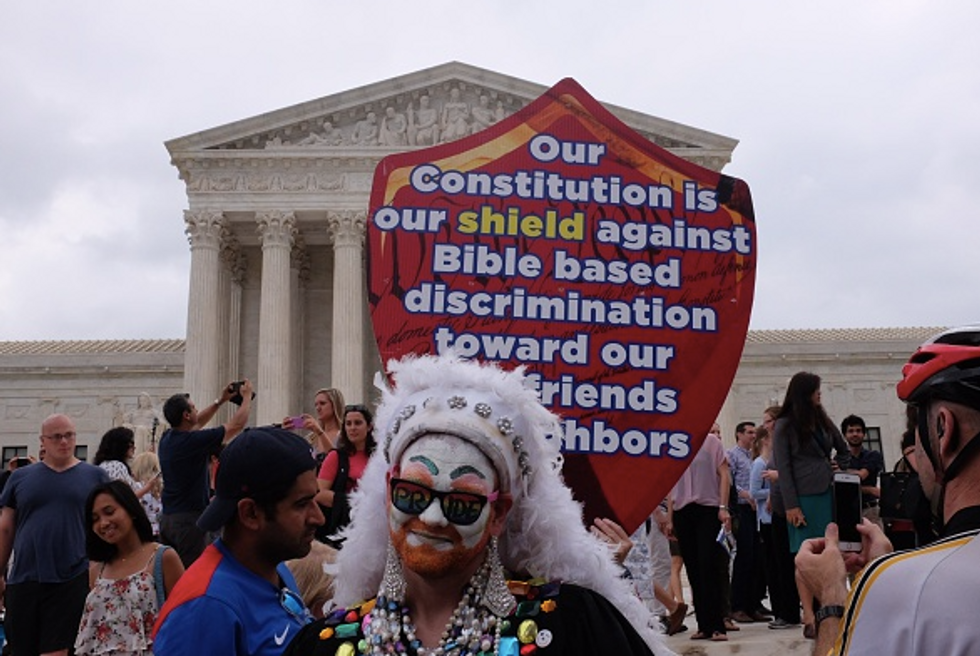
Hundreds gather outside of the Supreme Court on Friday to celebrate the decision to legalize gay marriage in all 50 states, in Washington, on June 26, 2015. (Photo by Michael Hernandez/Anadolu Agency/Getty Images)

The Supreme Court’s ruling on gay marriage may be settled law, but how to reconcile it with religious freedom could mean “decades and decades” of litigation, a religious freedom law expert said, reflecting some of the concerns raised in the dissent that called a clash “all but inevitable.”
The high court’s 5-4 ruling that gay marriage must be legal in all 50 states will likely prompt future cases such as whether a church opposed to gay marriage could be required to perform ceremonies, if a religious college would have to accommodate same-sex married couples in married student housing or if Christian marriage counselors would have to accommodate same-sex couples.

The majority opinion spoke to religious freedom, but did not delve deeply on the matter.
“Finally, it must be emphasized that religions, and those who adhere to religious doctrines, may continue to advocate with utmost, sincere conviction that, by divine precepts, same-sex marriage should not be condoned,” said the majority opinion, written by Justice Anthony Kennedy.
“The First Amendment ensures that religious organizations and persons are given proper protection as they seek to teach the principles that are so fulfilling and so central to their lives and faiths, and to their own deep aspirations to continue the family structure they have long revered,” the majority opinion in favor of gay marriage continued. “The same is true of those who oppose same-sex marriage for other reasons.”
The door cracked open for more legal challenges, said Jeremy Tedesco, senior counsel for Alliance Defending Freedom, such as gay couples demanding public accommodation from religious institutions.
“The Supreme Court doesn’t say anything emphatically how to deal with religious freedom issues and this is something that over decades and decades will have to play out in the courts,” Tedesco told TheBlaze Friday.
Alliance Defending Freedom is an Arizona-based public interest law firm that defends religious freedom cases across the country.
Regarding the majority opinion, Tedesco credited Kennedy with at least recognizing the potential conflicts.
“There are important recognitions of freedoms, but I don’t think the majority opinion touched on every area,” he said.
Already gay couples have sued to force privately-owned businesses such as bakeries, catering services and wedding photographers do business with them for weddings, regardless of the conscience of the business owners.
“There isn’t any question the other side’s endgame is coercion,” Tedesco said. “This decision emboldens those who want to coerce people to agree with them. Unfortunately that is there agenda.”
Event President Barack Obama made passing reference to religious liberty in his Rose Garden speech Friday celebrating the high court's ruling.
"All of us who welcome today’s news should be mindful of that fact; recognize different viewpoints; revere our deep commitment to religious freedom," Obama said.
In one of four dissents, Chief Justice John Roberts argued the decision “creates serious questions about religious liberty.”
“Respect for sincere religious conviction has led voters and legislators in every state that has adopted same-sex marriage democratically to include accommodations for religious practice,” Roberts wrote. “The majority’s decision imposing same-sex marriage cannot, of course, create any such accommodations.”
“Hard questions arise when people of faith exercise religion in ways that may be seen to conflict with the new right to same-sex marriage – when, for example, a religious college provides married student housing only to opposite-sex married couples, or a religious adoption agency declines to place children with same-sex married couples,” Roberts continued.
Justice Clarence Thomas said “the majority’s decision threatens the religious liberty our nation has long sought to protect.”
“In our society, marriage is not simply a governmental institution; it is a religious institution as well,” Thomas wrote in his dissent. “Today’s decision might change the former, but it cannot change the latter. It appears all but inevitable that the two will come into conflict, particularly as individuals and churches are confronted with demands to participate in and endorse civil marriages between same-sex couples.”
Tedesco said the ADF will identify and respond when cases come up.
“There will be pushback when this decision is used to try to restrict religious freedom or free speech,” Tedesco said.